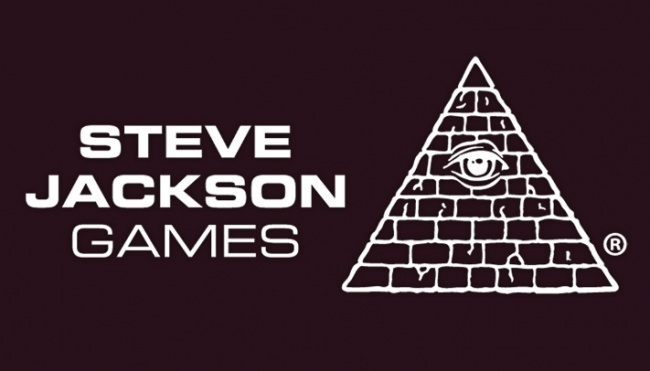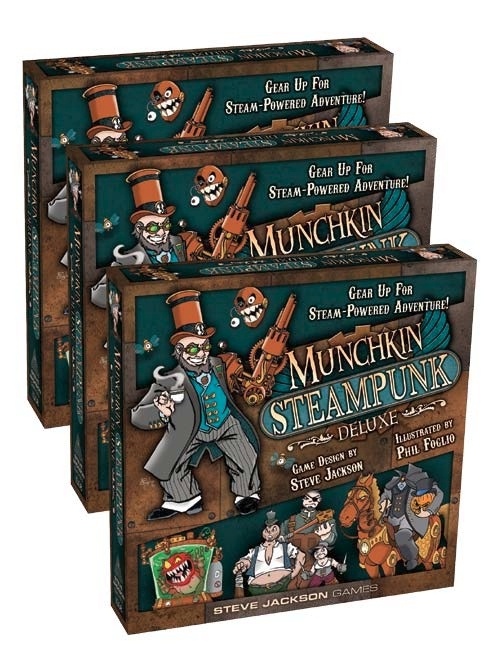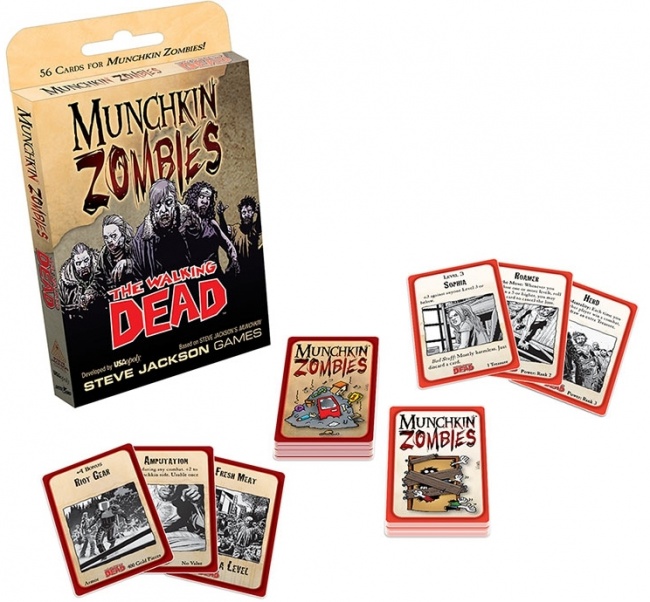At the GAMA Trade Show, ICv2 spoke with Steve Jackson Games’ Chief Operating Officer, Managing Editor Philip Reed and Line Editor for Munchkin Andrew Hackard about plans for licensed games, the amazing sales growth of the brand, and the sales patterns they’re seeing.
Separately, see our discussion of the return of Car Wars Arena and the Car Wars Card Game (see “'Car Wars Arena' Reprint”), and the company’s announcement of a new Ogre game (see “Steve Jackson Games Announces ‘Ogre: Operation 218”).
Munchkin has vastly expanded its footprint in the last year primarily through licensing. Can you talk about your strategy as far as what you license and why you’re embarking on this program of allowing other people to use Munchkin in their properties?
Philip Reed: In terms of gaming, Munchkin is something that we know our fan base loves. They loved playing Munchkin and they want to play other games so by partnering with someone like Atlas Games to create Munchkin Gloom we allow people to keep enjoying the Munchkin characters and designs but play a different game.
The Munchkin game itself is an hour to hour-and-a-half-long game; by going with Alderac and Loot Letter we can give them a Munchkin game to play that’s a shorter experience so it’s something faster. Munchkin started as a filler game that you’re going to play before you start your role-playing game session that night but it’s evolved into ‘no, we’re going to play Munchkin.’ Munchkin Smash Up gives people another way for people to experience Munchkin.
Do these other play experiences with the Munchkin characters cannibalize your Munchkin core sales or expand them?
Reed: So far it’s been an expansion of core sales because we have some people who maybe are aware of Munchkin but have never tried playing Munchkin. For example they’re really big fans of Castle Panic, so the Munchkin Panic game comes out from Fireside Games. Now they’re getting introduced to Munchkin, which they hadn’t played before, and they turn around and say ‘this was really fun, let me go try this Munchkin game.’
So it gets people to sample Munchkin?
Reed: Yes, to get a feel for it. And it is part of this whole world-building of Munchkin by getting these characters into new places. Part of the reason for the comic book is just to build that and make the characters even more characters. Put some story to the crazy game people have played for 14 years now.
In addition to the comics, what are some of the other non-gaming licenses for Munchkin?
Reed: Something we’ve made for years ever since Munchkin came out was shirts. We’ve made a lot of Munchkin shirts but we’re not a shirt company. It’s not our specialty so we partnered with the guys at WeLoveFine and they make shirts and that is their specialty, so now they’re making Munchkin shirts. They ran a great contest to let people submit designs, to have Munchkin shirts.
What channels do you sell your own Munchkin games through?
Reed: The hobby, comics stores, mass specialty—so Toys R’ Us, Barnes and Noble, Books-a-Million, Hastings, Entertainment Earth—places like that, and some of the mass big box like Target and Walmart.
Are you having any channel conflict issues as a result of that?
Reed: No. If anything, what we’re seeing is we have the basic Munchkin game in a lot more places and we’re selling more of that than ever before. Last year again was over 100,000 units on the base game and then another 100,000 on the deluxe version.
All channels combined?
Reed: Yes.
So, they can go to Toys R’ Us, Walmart, Target, they can buy Munchkin, but those stores are not set up to carry the expansions so the players who get Munchkin for Christmas from Toys R’ Us or wherever, if they have a good time and want more, they need to go into the hobby. We’re seeing the sales of the expansion product just continue to rise the more core we sell.
One of the interesting things you did was a pop-up store in New York near Toy Fair (see “Pop-Up 'Munchkin' Store”). What were your goals and results from that?
Reed: My only goal with that was to get toy store buyers, mass buyers to not forget that Munchkin exists. That was all about perception, brand-building and keeping it in everybody’s awareness.
Did you get local or trade press?
Reed: Not even press was the thing. We were on Restaurant Row, which is where a lot of buyers go at night. They have business dinners. I knew we were successful on the first day when we ran into one of the major buyers and he said ‘I was having dinner last night and I saw the Munchkin store.’ It was amazing.
So that was my main goal, but the other side was to give Munchkin players an experience to go have some fun and get Steve [Jackson], John [Kovalic] and Andrew [Hackard] all in the same place, which doesn’t happen often. Everybody I talked to who went there to play games and just see what we were doing had a great time. It was huge success.
People told us that even if they didn’t go in they saw lines outside and there was a lot of excitement around it. It was unusual for Toy Fair because you don’t usually think of off-site events other than some of the big manufacturers.
Reed: Mattel has a show room, Hasbro has a showroom, it’s not limited to them. Any of us can have fun and do those sorts of things.
It’s more a San Diego sort of thing because it was a nearby, brand takeover sort of thing.
Reed: The placement was very specific because that’s Restaurant Row. All the great restaurants within walking distance of the Javits are there.
You mentioned about 200,000 units of the core game last year. It seems like Munchkin has just exploded. How does that compare to five years ago?
Reed: I would have to pull a chart, but in 2010, that was the first year we had a little bit of a spike, higher sales in Barnes and Nobles, and places like that.
Hackard: I’m looking at the first 10 months of 2011 numbers and extrapolating from that I’m guessing 2011 was probably about 65,000-70,000. When you add in Deluxe, it was probably closer to 80,000.
So sales roughly tripled between 2011 and 2014. In terms of the rate of change, is that increasing?
Reed: It’s still climbing and we’re doing everything we can to keep that working. The nice thing about Munchkin Deluxe is we haven’t seen it eat into the core Munchkin sales. They’re not cannibalizing each other.
Are customers buying both?
Reed: It’s not that they’re buying both, it’s that we’ve been doing enough and getting enough eyes on Munchkin that the entire brand is growing and the number of people playing the game continues to grow.
So it’s just another option for a new consumer?
Reed: It’s another option.
How many Munchkin SKUs are there?
Reed: I don’t know. I quit counting.
Can you give us a range?
Reed: More than 10; fewer than 100.
Andrew Hackard: I’m willing to commit to more than 100.
Reed: I had this exact discussion with a buyer one day. She asked how many different Munchkin titles are there, and I told her ‘I don’t know.’ She said, ‘Really, you don’t know what you sell?’ and the answer to that is ‘no, I gave up.’ We just continue to make so much stuff.
Do you keep everything in print?
Reed: Most everything. Expansions and core games we try to keep in print at all times. Little add-on things like Boxes of Holding, different dice, dice bags, little weird things like that we’ll let go in and out. For example we’re just now reprinting the original Boxes of Holding that’s been out 18 months or two years. It’s been a while.
Hackard: Enough that we did a second set.
Reed: If I need to know exactly how many there are, I’ll just look online.
How big of an impact was the Tabletop exposure for Munchkin?
Reed: I think initially it was pretty significant.
Hackard: It paralleled us having more mass exposure.
Reed: Yeah, the timing was perfect because that was right as the Target test was going from test to full chain so it’s harder to say it was one of those things. There was a lot going on at that point.
Hackard: That said, when they did Zombie Dice, we saw a definite spike.
Reed: That was huge. We had what we thought was enough stock to get through the rest of the year and it was gone within a week or so and we had to scramble to reprint.
Is there a limit on the number of games you think you can successfully license out to other companies?
Reed: For example, a Settlers of Munchkin or Munchkin-opoly, or Ticket to Munchkin? I think there is, and we wouldn’t want too many to be available at the exact same time. Right now there’s a Munchkin co-op game, it would be better to let that game sell through and then have a new Munchkin co-op game than it is to have two Munchkin co-op games at the same time, but we’re not quite there yet. This is still very new for Munchkin and we’re still getting our feet wet.
Anything else that you think we should know about Munchkin?Reed: We’ve announced Munchkin trading cards from Renegade Games. We’ve got Munchkin Steampunk Deluxe coming up in July. We announced it last year at Gen Con but have since made the decision to go straight to a deluxe game, and we’re only offering it to the hobby market this year. We’re not taking it to other channels at this time.
The expansions are primarily hobby exclusive?
Reed: The expansions are hobby exclusive, but the actual core games, Munchkin Cthulhu, Munchkin Legends, for example, those are titles that the bigger stores are always looking at and interested in, but with Steampunk Deluxe, we’re hobby only this year.
Steampunk is a pretty geeky thing.
Reed: Yeah, it is. A lot of retailers were asking us ‘where’s our exclusive?’ And we decided we’ll try this out and see how it works.
Hackard: We’ve never even offered it to the mass market.
One of the things we’ve noticed with Steve Jackson Games and others, is this new method of doing a deal with companies like USAopoly which mashes up two licensed IPs into a single game.Reed: And they’re not done with that either because Munchkin Adventure Time 2 comes out next month. They’ve announced the Munchkin Zombies Walking Dead and the Munchkin Nightmare Before Christmas.
[Ed note: USAopoly says the Munchkin Zombies Walking Dead expansion to Munchkin Zombies will be available this summer at $19.95 MSRP.]
Does that create unique problems for approvals?
Reed: It’s more complicated. It’s most difficult for them because they’re in the middle of two separate companies making approvals, but so far we’ve managed. We’ve done well.
Hackard: I know Walking Dead is at press now and we have Nightmare Before Christmas for approval. When they were working on Adventure Time we went up to Cartoon Network for the three-cornered discussion of how the game was going to work. They’re very much trying to keep both sides satisfied.
Reed: They’ve got experience with this because they do a lot of licensed games.
Any observations on the hobby market as a whole?
Reed: I think things are going very well for the hobby market as a whole. From what I can tell all the retailers are happy, publishers that I talked with are happy. From our perspective, things are better than they’ve ever been before.
Hackard: Anecdotally in Austin we’ve had three new game stores open in the past couple of years. It seemed like for a while people were consolidating, games stores were combining or closing, we’re starting to see that trend back up.





